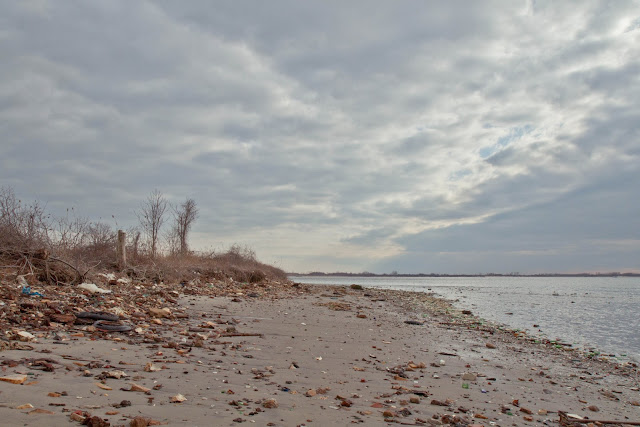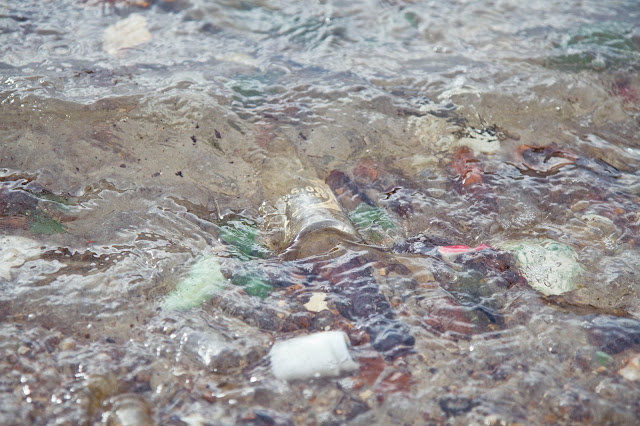Living in
Brooklyn, I often forget how close I am to the Atlantic Ocean: salt water,
sand, boardwalks, seafood. Having only been to Coney Island once a couple years
back, my knowledge of Brooklyn beaches is regrettably limited (and a bit
tainted having seen the aftermath of the Mermaid Parade). Since moving to the
borough in November, I've overheard fascinating tales of Dead Horse Bay. The
history of what was once known as Barren Island is dark and intriguing: soap
factories, fertilizer production, child labor, destitution. But my interests
were peaked after discovering images of now littered beaches, a result of a
landfill explosion in the 1950s. There are tiny glass treasures,
machine scraps, unwanted toys and horse bones decomposing and waiting for a
curious eye and an empty pocket. The adventurer in me had long since decided it
was time to visit this extraordinary site.
My Mondays
are usually designated for getting a head start on my week, but today the sun
was intermittently warming Brooklyn—a rare occurrence in February. I made a few phone calls and was able to embark on my
adventure with some worthy accomplices. After a quiet drive through South
Brooklyn, we arrived at Floyd Bennett Field, a recreational park still hosting
the remains of what was once an airfield. Parking just past a run-down hanger,
we gathered our equipment (cameras, plastic totes, rain boots, Orange Slice)
and embarked on the short walk through bustling traffic and then across quiet
dunes.
A lover of
consignment and thrift shops, I've always been an advocate of the idiom,
"One man's trash is another man's treasure." But this was unlike any
Goodwill or rural mom n' pop second-hand store. This was literal garbage. Immigrant
workers that had once inhabited Barren Island and paid to find worthy items
sifted through these piles long ago, followed by tens-of-thousands of New
Yorkers and tourists who filled buckets and bags with prizes for their shelves.
We set our discouragement aside, and convinced ourselves that a worthwhile hunt
awaited us. And we were right: with anticipation in our gait, we emerged onto
"Bottle Beach," and jaws dropped. I had braced for a small beach with
a few glass bottles and scattered metal scraps. But, stretching for at least a half-mile
in each direction, the refuse was vast and layered, sand filling the tiny gaps
between curves of aluminum and barnacle-crusted glass. It was like a giant Shepherd’s
Pie of waste.
After the
initial shared bewilderment—passing milk glass dishes to our nearest companion,
pointing out unreachable metal trinkets—we began our unaccompanied
explorations. I immediately allowed myself to collect overzealously, filling my
tote with any glass item that had not been shattered or broken on its journey
to where I stood. There is so much history in these possessions and it was hard
to ignore that, at some point, every object had an owner and that owner a
story: a small child outgrowing his Jacks, the pharmacist with a bankrupt
apothecary, a privileged Manhattan wife with the last drops of a favorite musk
on her nape. I could see them with every bottle I rinsed, every broken teacup I
returned to the waves.
In my
solitude I began listening. There were faint cries of gulls in the distance, a
low hum of cars—familiar sounds in an unfamiliar landscape. But there was also
unusual music at my feet. The now receding tide was gently washing empty
bottles ashore, introducing them to the already beached glassware with a gentle
clink. All along the beach varying circumstances created an endemic melody like
that of a wind chime. Shards of ceramic plates and crystal stemware crunched in
rhythm under my boots.
After
nearly two hours, with bags and pockets full, we took a seat on a bench near
the trail. We were exhausted from the experience but excited to share and trade
our finds. Among the rows and rows of treasures were a tiny metal baby (a
child's toy), miniature perfume bottles crafted of colorful glass, large hexagonal
tiles and peculiar minerals dotted with rust.
Hungry and winded
after our exploration, we celebrated our experience over guacamole at a South
Brooklyn Mexican eatery. We ate and laughed at our fascination with trash and
animal remains (no weak stomachs at that table). We planned future Monday
adventures: Roosevelt Island, Plum Beach, Jamaica Bay, but not before clinking glass-bottled
cokes in a toast to "Bottle Beach."
Edited by Adam Risman
Edited by Adam Risman







